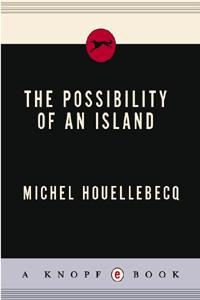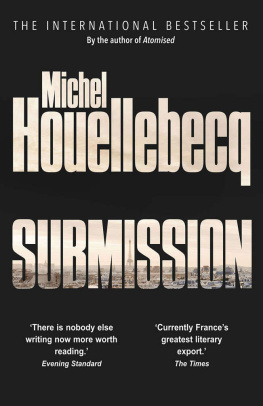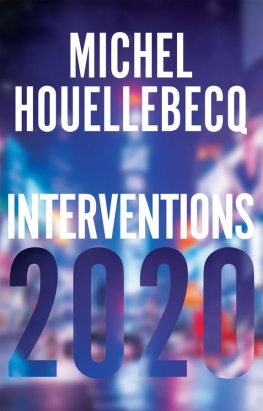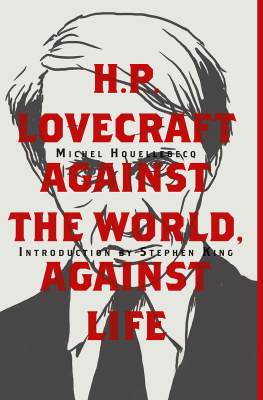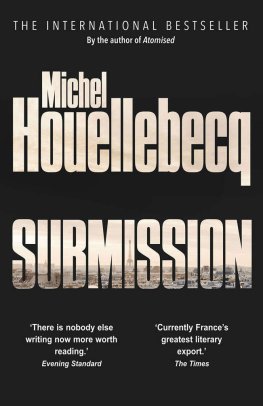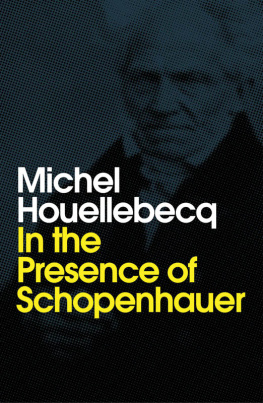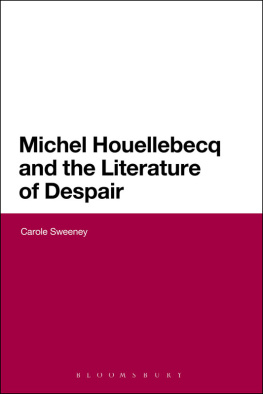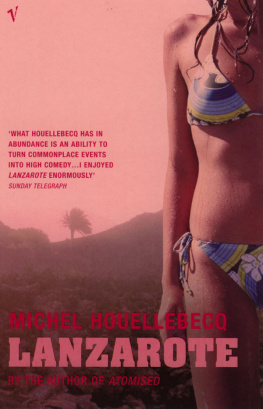Michel Houellebecq - The elementary particles
Here you can read online Michel Houellebecq - The elementary particles full text of the book (entire story) in english for free. Download pdf and epub, get meaning, cover and reviews about this ebook. year: 2000, publisher: Knopf, genre: Non-fiction. Description of the work, (preface) as well as reviews are available. Best literature library LitArk.com created for fans of good reading and offers a wide selection of genres:
Romance novel
Science fiction
Adventure
Detective
Science
History
Home and family
Prose
Art
Politics
Computer
Non-fiction
Religion
Business
Children
Humor
Choose a favorite category and find really read worthwhile books. Enjoy immersion in the world of imagination, feel the emotions of the characters or learn something new for yourself, make an fascinating discovery.

- Book:The elementary particles
- Author:
- Publisher:Knopf
- Genre:
- Year:2000
- Rating:3 / 5
- Favourites:Add to favourites
- Your mark:
- 60
- 1
- 2
- 3
- 4
- 5
The elementary particles: summary, description and annotation
We offer to read an annotation, description, summary or preface (depends on what the author of the book "The elementary particles" wrote himself). If you haven't found the necessary information about the book — write in the comments, we will try to find it.
The elementary particles — read online for free the complete book (whole text) full work
Below is the text of the book, divided by pages. System saving the place of the last page read, allows you to conveniently read the book "The elementary particles" online for free, without having to search again every time where you left off. Put a bookmark, and you can go to the page where you finished reading at any time.
Font size:
Interval:
Bookmark:
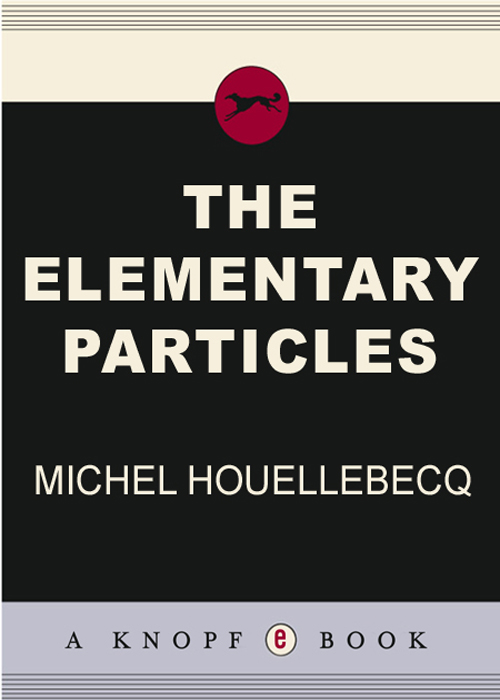
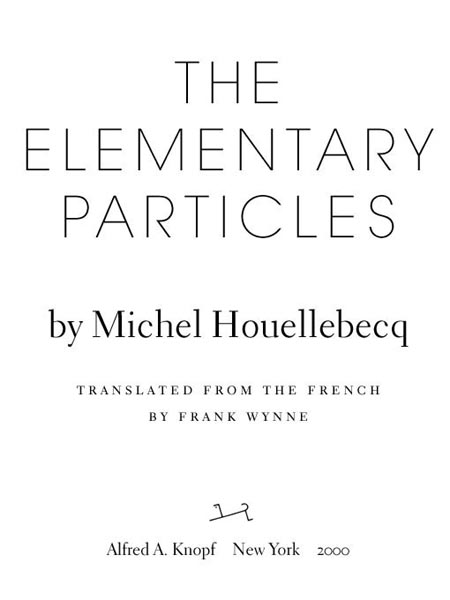
Table of Contents
Prologue
This book is principally the story of a man who lived out the greater part of his life in Western Europe, in the latter half of the twentieth century. Though alone for much of his life, he was nonetheless occasionally in touch with other men. He lived through an age that was miserable and troubled. The country into which he was born was sliding slowly, ineluctably, into the ranks of the less developed countries; often haunted by misery, the men of his generation lived out their lonely, bitter lives. Feelings such as love, tenderness and human fellowship had, for the most part, disappeared. The relationships between his contemporaries were at best indifferent and more often cruel.
At the time of his disappearance, Michel Djerzinski was unanimously considered to be a first-rate biologist and a serious candidate for the Nobel Prize. His true significance, however, would not become apparent for some time.
In Djerzinskis time, philosophy was generally considered to be of no practical significance, to have been stripped of its purpose. Nevertheless, the values to which a majority subscribe at any given time determine societys economic and political structures and social mores.
Metaphysical mutationsthat is to say radical, global transformations in the values to which the majority subscribeare rare in the history of humanity. The rise of Christianity might be cited as an example.
Once a metaphysical mutation has arisen, it tends to move inexorably toward its logical conclusion. Heedlessly, it sweeps away economic and political systems, aesthetic judgments and social hierarchies. No human agency can halt its progressnothing except another metaphysical mutation.
It is a fallacy that such metaphysical mutations gain ground only in weakened or declining societies. When Christianity appeared, the Roman Empire was at the height of its powers: supremely organized, it dominated the known world; its technical and military prowess had no rival. Nonetheless, it had no chance. When modern science appeared, medieval Christianity was a complete, comprehensive system which explained both man and the universe; it was the basis for government, the inspiration for knowledge and art, the arbiter of war as of peace and the power behind the production and distribution of wealthnone of which was sufficient to prevent its downfall.
Michel Djerzinski was not the first nor even the principal architect of the thirdand in many respects the most radicalparadigm shift, which opened up a new era in world history. But, as a result of certain extraordinary circumstances in his life, he was one of its most clear-sighted and deliberate engineers.
We live today under a new world order,
The web which weaves together all things envelops our bodies,
Bathes our limbs,
In a halo of joy.
A state to which men of old sometimes acceded through music
Greets us each morning as a commonplace.
What men considered a dream, perfect but remote,
We take for granted as the simplest of things.
But we are not contemptuous of these men;
We know how much we owe to their dreaming,
We know that without the web of suffering and joy which was their history, we would be nothing,
We know that they kept within them an image of us, through their fear and in their pain, as they collided in the darkness,
As little by little, they wrote their history.
We know that they would not have survived, that they could not have survived, without that hope somewhere deep within,
They could not have survived without their dream.
Now that we live in the light,
Now that we live in the presence of the light
Which bathes our bodies,
Envelops our bodies,
In a halo of joy,
Now that we have settled by the waters edge,
And here live in perpetual afternoon
Now that the light which surrounds our bodies is palpable,
Now that we have come at last to our destination
Leaving behind a world of division,
The way of thinking which divided us,
To bathe in a serene, fertile joy
Of a new law,
Today,
For the first time,
We can revisit the end of the old order.
PART ONE
The Lost Kingdom
The first of July 1998 fell on a Wednesday, so although it was a little unusual, Djerzinski organized his farewell party for Tuesday evening. Bottles of champagne nestled among containers of frozen embryos in the large Brandt refrigerator usually filled with chemicals.
Four bottles for fifteen people was a little miserly, but the whole party was a sham. The motivations that brought them together were superficial; one careless word, one false glance, would break it up and send his colleagues scurrying for their cars. They stood around drinking in the white-tiled basement decorated only with a poster of the Lakes of Germany. Nobody had offered to take photos. A research student who had arrived earlier that yeara young man with a beard and a vapid expressionleft after a few minutes, explaining that he had to pick up his car from the garage. A palpable sense of unease spread through the group. Soon the term would be over; some of them were going home to visit family, others on vacation. The sound of their voices snapped like twigs in the air. Shortly afterward, the party broke up.
By seven-thirty it was all over. Djerzinski walked across the parking lot with one of his colleagues. She had long black hair, very white skin and large breasts. Older than he was, she would inevitably take his position as head of the department. Most of her published papers were on the DAF3 gene in the fruit fly. She was unmarried.
When they reached his Toyota he offered his hand, smiling. (He had been preparing himself mentally for this for several seconds, remembering to smile.) Their palms brushed and they shook hands gently. Later, he decided the handshake lacked warmth; under the circumstances, they could have kissed each other on both cheeks like visiting dignitaries or people in show business.
After they said their goodbyes, he sat in his car for what seemed to him an unusually long five minutes. Why had she not driven off? Was she masturbating while listening to Brahms? Perhaps she was thinking about her career, her new responsibilities: if so, was she happy? At last her Golf pulled out of the lot; he was alone again. The weather had been magnificent all day, and it was still warm now. In the early weeks of summer everything seemed fixed, motionless, radiant, though already the days were getting shorter.
He felt privileged to have worked here, he thought as he pulled out into the street. When asked Do you feel privileged to live in an area like Palaiseau? sixty-three percent of respondents answered Yes. This was hardly surprising: the buildings were low, interspersed with lawns. Several supermarkets were conveniently nearby. The phrase quality of life hardly seemed excessive for such a place.
The expressway back into Paris was deserted, and Djerzinski felt like a character in a science fiction film hed seen at the university: the last man on earth after every other living thing had been wiped out. Something in the air evoked a dry apocalypse.
Next pageFont size:
Interval:
Bookmark:
Similar books «The elementary particles»
Look at similar books to The elementary particles. We have selected literature similar in name and meaning in the hope of providing readers with more options to find new, interesting, not yet read works.
Discussion, reviews of the book The elementary particles and just readers' own opinions. Leave your comments, write what you think about the work, its meaning or the main characters. Specify what exactly you liked and what you didn't like, and why you think so.

